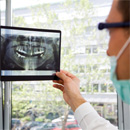 Not to enter the fray of fear mongering, but there is an important bit of health news that must be shared. And it isn’t good. The largest study of its kind has uncovered a link between getting frequent dental x-rays and brain cancer. Let’s take a close look.
Not to enter the fray of fear mongering, but there is an important bit of health news that must be shared. And it isn’t good. The largest study of its kind has uncovered a link between getting frequent dental x-rays and brain cancer. Let’s take a close look.
Meningioma is the most common primary brain tumor in the U.S. The biggest environmental risk factor for it is exposure to ionizing radiation. Researchers from several universities found a correlation between past frequent dental x-rays and the risk of getting meningioma. X-rays are the most common source of exposure to ionizing radiation.
The message arising from this is that, although dental x-rays are necessary in many cases, moderate use of this form of imaging may be of benefit to some patients. Because in cancer prevention, it is a game of minimizing risk. You drink, say, green tea to help reduce your risk, but then you got seven dental x-rays last month for a root canal. For all we know, the x-rays cancelled out your green tea, and raised your risk further.
RECOMMENDED: Good Dental Care Can Stave Off This Killer Disease
Researchers studied data from 1,433 patients diagnosed with meningioma between 20 and 79 years of age between May 2006 and April 2011. They compared the information to a control group of 1,350 participants with similar characteristics. Patients with meningioma were twice as likely to report having a specific type of dental x-ray called a “bitewing exam,” and those who reported having them every year or more frequently were nearly twice as likely develop a meningioma.
Also, researchers report an even greater increased risk of meningioma in patients who underwent a “panorex” x-ray exam. Used in youngsters under the age of 10, it led to a nearly five-fold increase in the risk of brain tumors compared to controls. And those who reported having the exam yearly or more frequently than once a year were nearly three times as likely to develop meningioma.
Importantly, we have advanced in this area and dental x-rays today use much less radiation than those performed in the past. So on that note, positive news.
So where do the experts stand? The American Dental Association’s statement on the use of dental radiographs emphasizes the need for dentists to examine the risks and benefits of dental x-rays and confirms that there is little evidence to support the use of dental x-rays in healthy patients.
